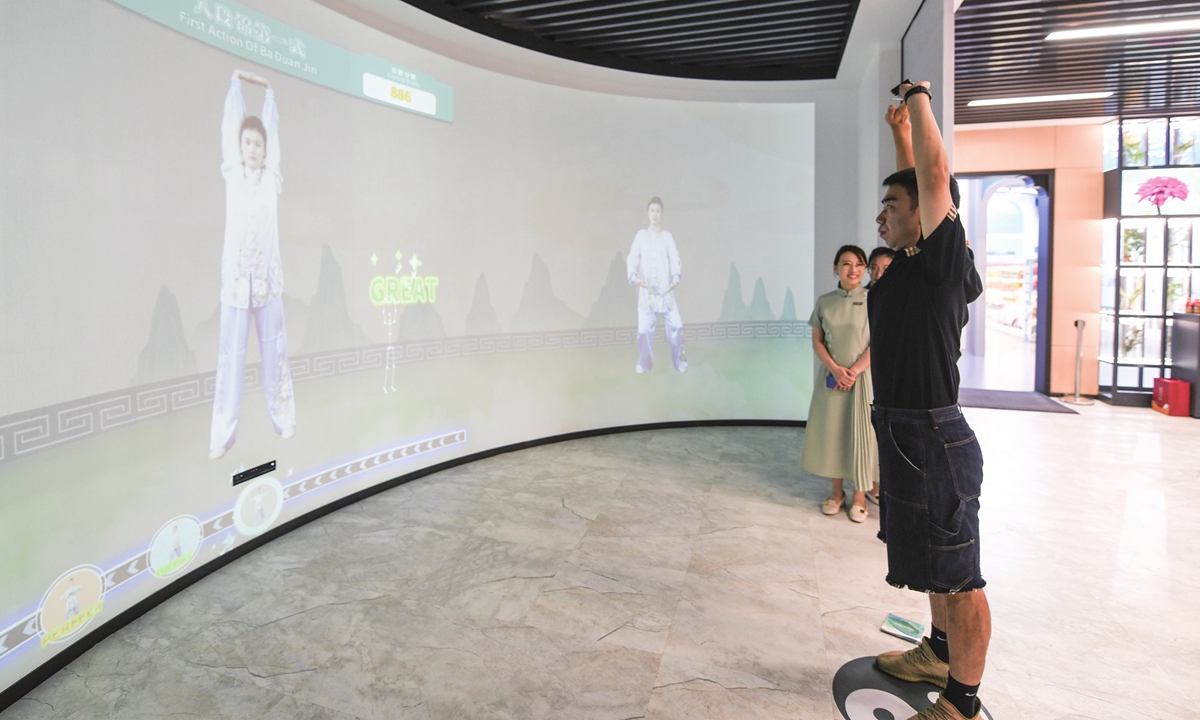
Visual Chinese traditional exercise classes are provided through a big screen inside the Main Media Center of the Asian Games. Photo: VCG
Traditionally, fireworks are an integral part of the opening ceremonies of major sports events.
However, the much-anticipated opening ceremony of the Hangzhou Asian Games will not use this traditional celebratory feature to welcome the beginning of the 16-day event, as organizers aim at lowering the cost of the event, making it as sustainable as possible.
"The opening ceremony of the Hangzhou Asian Games will break the tradition of having firework performances, as we are sticking to a green philosophy in hosting the event," said Sha Xiaolan, the general director of the Games' opening ceremony.
"As we want to reduce carbon emissions as much as possible, we have decided to cut the fireworks performances."
Though there will be no fireworks display at the opening ceremony, technological elements are expected to be implemented to enthrall the audience inside the Hangzhou Olympic Sports Center Stadium.
The city of Hangzhou, East China's Zhejiang Province, which is scheduled to host the 19th Asian Games from September 23 to October 8, has vowed to host a "zero-carbon" Asian Games, with all the competition venues using green electricity.
Sustainability mattersAll 56 competition venues for the Hangzhou Asian Games were completed by the end of March 2022 before the Games were postponed to 2023, with 12 being newly built and the rest being renovated or built temporarily.
Located next to the main stadium, the Hangzhou Olympic Sports Centre Aquatic Sports Arena is also a popular destination for local fans as swimming competitions will be held in the arena and native Zhejiang athletes such as Ye Shiwen and Wang Shun as well as other Chinese swimmers are expected to compete there.
Despite being a significant consumer of water, the arena is now considered a water-saving role model as it boasts a water treatment system that allows the pool water to remain unchanged for an entire year.
"To maintain sound water quality, every drop of water undergoes seven rounds of screening," Xu Lingchong, a senior official with the Aquatic Sports Arena, told the Global Times.
"The filtration system is capable of removing substances that measure 1-2 micrometers in diameter, not only suspended solids but also parasites that are resistant to regular disinfection procedures."
The system helps save about 180,000 tons of water annually, nearly the equivalent to the annual water consumption of 4,000 local Hangzhou residents, according to He Xingyou, a local water-saving supervisor.
The installment also emphasizes the stringent water quality testing procedures in place, with frequent manual and machine inspections, which ensure that the water quality meets the requirements for competition.
Similarly, the Fuyang Water Sports Center can save around 1,000 tons of water per month, accounting for 35 percent of its consumption, thanks to the implementation of a rainwater recycling system.
The handball competition venue at the Zhejiang Gongshang University is also a pioneer in lowering the cost of hosting sports events.
Due to a floor resilience that cannot meet the requirements of the competitions, a new professional sports floor had to be installed.
However, the original floor had been used for only four years, meaning throwing them away would have been a huge waste.
"The original floor was dismantled and sent to Fenkou High School in Chun'an [a suburb in Hangzhou] for the upgrading of the school's stadium," said Ren Yuwei, an official with the university.
Located on the outskirts of Hangzhou, the Jieshou Sports Center in Chun'an is the main venue for cycling competitions.
To lower the cost of hosting the events, the venue operators chose to rent some facilities rather than building new ones on their own.
"We mainly follow the principle of renting instead of buying, and borrowing instead of renting," said Gu Yuanhao, a senior official with the Jieshou Sports Center.
"We borrowed the world-level racing track [rather than building a new one]. It saved us about 9 million yuan ($1.23 million)."
Besides the low-cost track renting, the on-site seats for spectators, lighting and flag-raising control systems and the video capture and playback systems are all non-permanent installations.
Digital torch relaysThe competition between elite athletes may dominate the event, but innovations in making these sporting events a sustainable reality are worthy of the public's attention as well.
Unlike the past major multi-sport tournaments where the torch relay went across a country or even internationally, Hangzhou has chosen to undergo its offline torch relay inside the Zhejiang Province.
But it does not mean Hangzhou is limiting the influence of the torch relay to its own province.
The digital torchbearer program has allowed millions of smartphone users to take part in the torch relay, as the organizers have announced that the online digital torch relay has attracted over 100 million participants since it was launched on June 15.
The digital torch relay is also expected to make its mark through a digital light show at the opening ceremony, organizers said.
Qiu Peihuang, the director of the venues department of the Games organizing committee, said that many of the Asian Games venues have been scheduled for reuse after the Games.
"Many venues will become fitness centers for local citizens while others will cooperate with commercial companies for cultural activities," he said.
Yao Gaoyuan, mayor of Hangzhou and vice-chairman and secretary-general of the Hangzhou Asian Games organizing committee, said the sustainable utilization is rather more important than the Games itself.
"Meeting the requirements of the competition is the 'first half of the article,'" Yao told a news conference.
"But sustainable utilization after the Games is the 'second half of the article,' which is even more important," he said.




